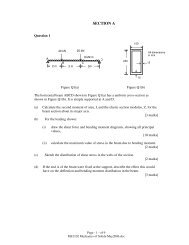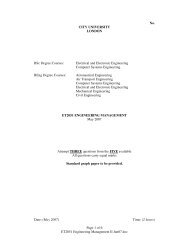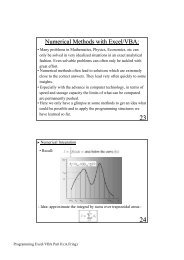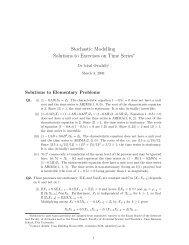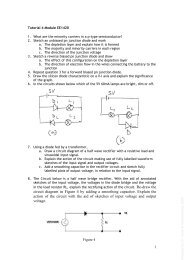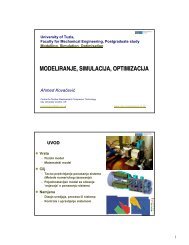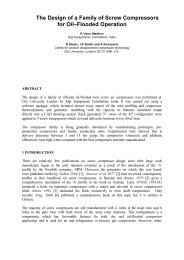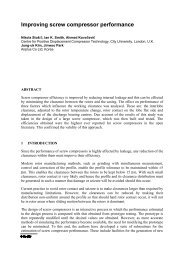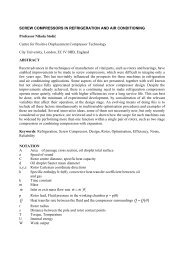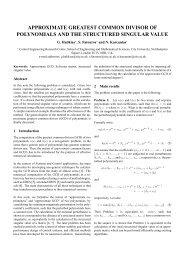the rise and fall of transnational civil society - Staff.city.ac.uk - City ...
the rise and fall of transnational civil society - Staff.city.ac.uk - City ...
the rise and fall of transnational civil society - Staff.city.ac.uk - City ...
Create successful ePaper yourself
Turn your PDF publications into a flip-book with our unique Google optimized e-Paper software.
Centre for International Politics<br />
WORKING PAPERS ON<br />
TRANSNATIONAL POLITICS<br />
THE RISE AND FALL OF<br />
TRANSNATIONAL CIVIL SOCIETY:<br />
THE EVOLUTION OF INTERNATIONAL<br />
NON-GOVERNMENTAL<br />
ORGANIZATIONS SINCE 1839<br />
Thomas Richard Davies<br />
Working Paper CUTP/003<br />
© Thomas Richard Davies, April 2008<br />
This is a work in progress. Feedb<strong>ac</strong>k welcome.<br />
Cont<strong>ac</strong>t: tom.davies@<strong>city</strong>.<strong>ac</strong>.<strong>uk</strong>
Introduction<br />
Three years before <strong>the</strong> outbreak <strong>of</strong> <strong>the</strong> First World War, a prominent American<br />
<strong>ac</strong>ademic <strong>and</strong> diplomat, Paul S. Reinsch, claimed that ‘<strong>the</strong> barren ideal <strong>of</strong> no<br />
war, no patriotism, no local interest, has given way to a potent centripetal<br />
force…cosmopolitanism is no longer a castle in <strong>the</strong> air, but it has become<br />
incorporated in numerous associations <strong>and</strong> unions world-wide in <strong>the</strong>ir cooperation.’<br />
1 Similarly, in <strong>the</strong> post-Cold War era it has been claimed that<br />
<strong>transnational</strong> (or global) <strong>civil</strong> <strong>society</strong> may provide ‘an answer to war’. 2 Much <strong>of</strong><br />
<strong>the</strong> evidence provided in this paper suggests that <strong>the</strong>re are reasons to be as<br />
cautious about such claims today as a century ago.<br />
This paper is an early step in an endeavour to explore <strong>the</strong> history <strong>of</strong><br />
<strong>transnational</strong> <strong>civil</strong> <strong>society</strong>. Contrary to conventional wisdom, it will suggest that<br />
<strong>transnational</strong> <strong>civil</strong> <strong>society</strong> may not have developed following a course <strong>of</strong> linear<br />
progress. Instead, <strong>the</strong> paper will <strong>of</strong>fer an outline history that suggests that<br />
<strong>transnational</strong> <strong>civil</strong> <strong>society</strong> <strong>rise</strong>s <strong>and</strong> <strong>fall</strong>s in waves.<br />
The paper begins with an introduction to what is meant by <strong>transnational</strong><br />
<strong>civil</strong> <strong>society</strong> <strong>and</strong> a discussion <strong>of</strong> <strong>the</strong> possible ways <strong>of</strong> tr<strong>ac</strong>ing its historical<br />
evolution. It <strong>the</strong>n provides an assessment <strong>of</strong> <strong>the</strong> principal f<strong>ac</strong>tors that have<br />
affected <strong>the</strong> development <strong>of</strong> <strong>transnational</strong> <strong>civil</strong> <strong>society</strong>. Thirdly, <strong>the</strong> paper <strong>of</strong>fers<br />
an outline history <strong>of</strong> <strong>transnational</strong> <strong>civil</strong> <strong>society</strong> highlighting <strong>the</strong> different ways in<br />
which it has arguably ‘<strong>rise</strong>n’ <strong>and</strong> ‘<strong>fall</strong>en’ over time. The paper concludes with a<br />
brief assessment <strong>of</strong> arguments surrounding <strong>the</strong> future trajectory <strong>of</strong> <strong>transnational</strong><br />
<strong>civil</strong> <strong>society</strong>.<br />
1. Defining <strong>and</strong> measuring ‘<strong>transnational</strong> <strong>civil</strong> <strong>society</strong>’<br />
It is only recently – in <strong>the</strong> period since <strong>the</strong> end <strong>of</strong> <strong>the</strong> Cold War – that <strong>the</strong> term<br />
‘<strong>transnational</strong> <strong>civil</strong> <strong>society</strong>’ <strong>and</strong> <strong>the</strong> bolder term ‘global <strong>civil</strong> <strong>society</strong>’ have entered<br />
popular usage in <strong>ac</strong>ademic literature on international politics. As Helmut<br />
Anheier, Marlies Glasius <strong>and</strong> Mary Kaldor have argued, <strong>the</strong> meaning <strong>of</strong> <strong>the</strong>se<br />
1 Paul S. Reinsch, Public International Unions: Their Work <strong>and</strong> Organization: A Study In<br />
International Administrative Law (Boston: Ginn <strong>and</strong> Company, 1911), pp. 2, 4.<br />
2 Mary Kaldor, Global Civil Society: An Answer to War (Cambridge: Polity Press, 2003).<br />
2
terms is ‘subject to widely differing interpretations.’ 3 Never<strong>the</strong>less, most<br />
definitions refer to ‘uncoerced collective <strong>ac</strong>tion around shared interests,<br />
purposes <strong>and</strong> values’ 4 that is non-governmental <strong>and</strong> not for pr<strong>of</strong>it. 5 Whereas<br />
‘global <strong>civil</strong> <strong>society</strong>’ involves <strong>ac</strong>tivities that ‘straddle <strong>the</strong> whole earth, <strong>and</strong>…have<br />
complex effects that are felt in its four corners,’ 6 <strong>the</strong> less ambitious concept <strong>of</strong><br />
‘<strong>transnational</strong> <strong>civil</strong> <strong>society</strong>’ (which is <strong>the</strong> focus <strong>of</strong> this paper) refers to nongovernmental<br />
non-pr<strong>of</strong>it collective <strong>ac</strong>tion that transcends national boundaries<br />
but does not necessarily have global re<strong>ac</strong>h. The key <strong>ac</strong>tors in <strong>transnational</strong> <strong>civil</strong><br />
<strong>society</strong> are international non-governmental organizations (INGOs), i.e.<br />
international organizations that are nei<strong>the</strong>r pr<strong>of</strong>it-making nor instruments <strong>of</strong><br />
government, 7 as well as internationally-orientated national non-governmental<br />
organizations. A distinction is <strong>of</strong>ten made between international nongovernmental<br />
organizations that exist simply to provide services to <strong>the</strong>ir<br />
members <strong>and</strong> issue-oriented international non-governmental organizations,<br />
which are <strong>the</strong> principal focus in studies <strong>of</strong> <strong>transnational</strong> <strong>civil</strong> <strong>society</strong> <strong>and</strong><br />
<strong>the</strong>refore this paper too.<br />
In order to gain an underst<strong>and</strong>ing <strong>of</strong> how <strong>transnational</strong> <strong>civil</strong> <strong>society</strong> has<br />
evolved, it is necessary to think about how <strong>the</strong> phenomenon can be measured.<br />
The task <strong>of</strong> measuring <strong>transnational</strong> <strong>civil</strong> <strong>society</strong> is as problematic as <strong>the</strong> issue<br />
<strong>of</strong> definition, since <strong>the</strong> variety <strong>of</strong> f<strong>ac</strong>tors that potentially need to be taken into<br />
<strong>ac</strong>count is considerable. Much <strong>of</strong> <strong>the</strong> existing literature on <strong>transnational</strong> <strong>civil</strong><br />
<strong>society</strong> has focused on one major unit <strong>of</strong> assessment: <strong>the</strong> number <strong>of</strong> (issueoriented)<br />
international non-governmental organizations that exist. 8 This unit <strong>of</strong><br />
3 Helmut Anheier, Marlies Glasius <strong>and</strong> Mary Kaldor, ‘Introducing Global Civil Society,’ in Helmut<br />
Anheier, Marlies Glasius <strong>and</strong> Mary Kaldor (eds.), Global Civil Society 2001 (Oxford: Oxford<br />
University Press, 2001), p. 3.<br />
4 London School <strong>of</strong> Economics <strong>and</strong> Political Science Centre for Civil Society, ‘What is Civil<br />
Society?,’ http://www.lse.<strong>ac</strong>.<strong>uk</strong>/collections/CCS/what_is_<strong>civil</strong>_<strong>society</strong>.htm (last <strong>ac</strong>cessed on 15<br />
December 2006).<br />
5 Jan Aart Scholte, Global Civil Society: Changing <strong>the</strong> World? (Coventry: Centre for <strong>the</strong> Study <strong>of</strong><br />
Globalization <strong>and</strong> Regionalization (CSGR), University <strong>of</strong> Warwick, 1999), pp. 2-3.<br />
6 John Keane, Global Civil Society? (Cambridge: Cambridge University Press, 2003), p. 8.<br />
7 Lester M. Salamon <strong>and</strong> Helmut K. Anheier, Defining <strong>the</strong> Nonpr<strong>of</strong>it Sector: A Cross-National<br />
Analysis (Manchester: Manchester University Press, 1997). The original definition <strong>of</strong> an<br />
international non-governmental organization adopted by <strong>the</strong> Economic <strong>and</strong> Social Council <strong>of</strong> <strong>the</strong><br />
United Nations was much broader: ‘any international organization which is not established by<br />
intergovernmental agreement.’<br />
8<br />
See, for example, Kathryn Sikkink <strong>and</strong> J<strong>ac</strong>kie Smith, ‘Infrastructures for Change:<br />
Transnational Organizations, 1953-93,’ in Sanjeev Khagram, James Riker <strong>and</strong> Kathryn Sikkink<br />
(eds.), Restructuring World Politics: Transnational Social Movements, Networks <strong>and</strong> Norms<br />
(Minneapolis: University <strong>of</strong> Minnesota Press, 2002), 24-44.<br />
3
assessment appears to support <strong>the</strong> proposition that <strong>transnational</strong> <strong>civil</strong> <strong>society</strong><br />
has been following a path <strong>of</strong> linear progress. According to one source, whereas<br />
up to 1854 only six INGOs had been founded, by <strong>the</strong> turn <strong>of</strong> <strong>the</strong> century this<br />
figure had re<strong>ac</strong>hed 163, <strong>and</strong> by 1945 over a thous<strong>and</strong> INGOs had been<br />
established. 9 By 2007 it was claimed that <strong>the</strong>re were over 60,000 INGOs in <strong>the</strong><br />
world. 10 Beyond pointing out <strong>the</strong> increasing number <strong>of</strong> international nongovernmental<br />
organizations that have been founded, those who claim that<br />
<strong>transnational</strong> <strong>civil</strong> <strong>society</strong> has been following a path <strong>of</strong> linear progress also<br />
highlight its apparent contribution towards significant recent international<br />
developments. For instance, <strong>transnational</strong> <strong>civil</strong> <strong>society</strong> is said to have played an<br />
important role in bringing <strong>the</strong> Cold War to an end, has contributed towards <strong>the</strong><br />
redefinition <strong>of</strong> development <strong>and</strong> security to include humanitarian concerns, <strong>and</strong><br />
has helped f<strong>ac</strong>ilitate international agreements such as <strong>the</strong> 1987 Montreal<br />
Protocol <strong>and</strong> <strong>the</strong> 1997 Ottawa L<strong>and</strong>mines Convention.<br />
Although INGO numbers <strong>and</strong> <strong>the</strong> apparent imp<strong>ac</strong>t <strong>of</strong> <strong>transnational</strong> <strong>civil</strong><br />
<strong>society</strong> are <strong>the</strong> two principal means <strong>of</strong> gauging <strong>transnational</strong> <strong>civil</strong> <strong>society</strong> cited in<br />
<strong>the</strong> existing literature, both measures may be misleading. For instance, an<br />
expansion in <strong>the</strong> number <strong>of</strong> international non-governmental organizations may<br />
represent fragmentation <strong>of</strong> <strong>transnational</strong> <strong>civil</strong> <strong>society</strong> into smaller INGOs ra<strong>the</strong>r<br />
than growth. As for <strong>the</strong> apparent imp<strong>ac</strong>t <strong>of</strong> <strong>transnational</strong> <strong>civil</strong> <strong>society</strong> on recent<br />
developments, <strong>the</strong> relative contribution to <strong>the</strong>se developments <strong>of</strong> <strong>transnational</strong><br />
<strong>civil</strong> <strong>society</strong> compared with o<strong>the</strong>r f<strong>ac</strong>tors is very difficult to ascertain.<br />
Fur<strong>the</strong>rmore, <strong>transnational</strong> <strong>civil</strong> <strong>society</strong>’s influence on major developments in<br />
world politics is far from new: for instance <strong>transnational</strong> non-governmental<br />
<strong>ac</strong>tivism contributed to <strong>the</strong> abolition <strong>of</strong> <strong>the</strong> slave trade in <strong>the</strong> nineteenth century<br />
<strong>and</strong> to <strong>the</strong> foundation <strong>of</strong> <strong>the</strong> League <strong>of</strong> Nations <strong>and</strong> <strong>the</strong> United Nations<br />
Organization in <strong>the</strong> first half <strong>of</strong> <strong>the</strong> twentieth century.<br />
An examination <strong>of</strong> alternative methods <strong>of</strong> evaluating <strong>the</strong> evolution <strong>of</strong><br />
<strong>transnational</strong> <strong>civil</strong> <strong>society</strong> reveals that <strong>the</strong> development <strong>of</strong> this phenomenon may<br />
be more complex than has traditionally been portrayed. One alternative method<br />
9 G. P. Speeckaert, Les 1978 Organisations Internationales Fondées depuis le Congrès de<br />
Vienne (Brussels: Union <strong>of</strong> International Associations, 1957), viii.<br />
10 Source: Union <strong>of</strong> International Associations.<br />
4
<strong>of</strong> evaluating <strong>the</strong> development <strong>of</strong> <strong>transnational</strong> <strong>civil</strong> <strong>society</strong> is to assess <strong>the</strong><br />
number <strong>of</strong> INGO foundations <strong>and</strong> dissolutions per annum. As John Boli <strong>and</strong><br />
George Thomas have noted, although <strong>the</strong> total number <strong>of</strong> INGOs has increased<br />
overall since <strong>the</strong> nineteenth century, <strong>the</strong> number <strong>of</strong> INGOs founded e<strong>ac</strong>h year<br />
dropped considerably at <strong>the</strong> time <strong>of</strong> <strong>the</strong> First World War, <strong>and</strong> after recovering in<br />
<strong>the</strong> 1920s dropped again at <strong>the</strong> time <strong>of</strong> <strong>the</strong> Great Depression <strong>and</strong> Second World<br />
War. In <strong>the</strong> case <strong>of</strong> <strong>the</strong> number <strong>of</strong> INGO dissolutions per annum, <strong>the</strong>re were<br />
sharp increases during <strong>the</strong> two World Wars <strong>and</strong> <strong>the</strong> Great Depression. 11<br />
Fur<strong>the</strong>r methods <strong>of</strong> evaluating <strong>the</strong> development <strong>of</strong> <strong>transnational</strong> <strong>civil</strong><br />
<strong>society</strong> reveal a still more complex evolutionary path. A much-neglected but<br />
important consideration is <strong>the</strong> extent <strong>of</strong> popular participation in <strong>transnational</strong><br />
<strong>civil</strong> <strong>society</strong>. There are many different ways that popular participation in<br />
<strong>transnational</strong> <strong>civil</strong> <strong>society</strong> may be assessed. One option is to examine <strong>the</strong><br />
proportion <strong>of</strong> <strong>the</strong> world’s population represented in global campaigns, for<br />
instance through membership <strong>of</strong> an organization in a campaigning coalition or<br />
through signing a <strong>transnational</strong> petition. In <strong>the</strong> case <strong>of</strong> both <strong>of</strong> <strong>the</strong>se measures,<br />
participation in <strong>the</strong> main <strong>transnational</strong> <strong>civil</strong> <strong>society</strong> campaigns in <strong>the</strong> present era<br />
is arguably less substantial than in campaigns that took pl<strong>ac</strong>e more than<br />
seventy years ago. 12 The argument that <strong>transnational</strong> <strong>civil</strong> <strong>society</strong> has been<br />
following a path <strong>of</strong> linear progress must <strong>the</strong>refore be called into question.<br />
2. Explaining <strong>the</strong> evolution <strong>of</strong> <strong>transnational</strong> <strong>civil</strong> <strong>society</strong><br />
The third section <strong>of</strong> this paper will provide a narrative <strong>of</strong> how <strong>transnational</strong> <strong>civil</strong><br />
<strong>society</strong> has arguably <strong>rise</strong>n <strong>and</strong> <strong>fall</strong>en in waves since <strong>the</strong> mid-nineteenth century.<br />
This section <strong>of</strong> <strong>the</strong> paper will briefly introduce some <strong>of</strong> <strong>the</strong> main f<strong>ac</strong>tors that help<br />
to explain why <strong>transnational</strong> <strong>civil</strong> <strong>society</strong> may have evolved in this way. These<br />
f<strong>ac</strong>tors can be split into five categories: technological; economic; social; external<br />
political; <strong>and</strong> internal political. As will become apparent from <strong>the</strong> next section <strong>of</strong><br />
11 John Boli <strong>and</strong> George Thomas, Constructing World Culture: International Nongovernmental<br />
Organizations Since 1875 (Stanford, CA: Stanford University Press, 1999), 23-4.<br />
12 For a comparison <strong>of</strong> <strong>the</strong> scale <strong>of</strong> participation in contemporary campaigns with those that took<br />
pl<strong>ac</strong>e between <strong>the</strong> two World Wars, see section 3 <strong>of</strong> this paper <strong>and</strong> Thomas Richard Davies,<br />
The Possibilities <strong>of</strong> Transnational Activism: The Campaign for Disarmament between <strong>the</strong> Two<br />
World Wars (Leiden <strong>and</strong> Boston: Martinus Nijh<strong>of</strong>f, 2007), 159-60.<br />
5
this paper, many <strong>of</strong> <strong>the</strong> f<strong>ac</strong>tors that have in some ways contributed towards <strong>the</strong><br />
expansion <strong>of</strong> <strong>transnational</strong> <strong>civil</strong> <strong>society</strong> have in o<strong>the</strong>r ways contributed also<br />
towards its decline.<br />
Technological developments are amongst <strong>the</strong> most commonly cited<br />
reasons for <strong>the</strong> alleged expansion <strong>of</strong> <strong>transnational</strong> <strong>civil</strong> <strong>society</strong> in <strong>the</strong> post-Cold<br />
War era: cheap air travel <strong>and</strong> telecommunications, mobile telephones, <strong>and</strong> <strong>the</strong><br />
internet are all said to be making <strong>the</strong> post-Cold War world a smaller pl<strong>ac</strong>e.<br />
Similarly <strong>the</strong> emergence <strong>of</strong> <strong>transnational</strong> <strong>civil</strong> <strong>society</strong> in <strong>the</strong> mid-nineteenth<br />
century was f<strong>ac</strong>ilitated by innovations such as <strong>the</strong> steamship <strong>and</strong> electrical<br />
telegraphy.<br />
The global economy is ano<strong>the</strong>r f<strong>ac</strong>tor influencing <strong>the</strong> development <strong>of</strong><br />
<strong>transnational</strong> <strong>civil</strong> <strong>society</strong>: periods <strong>of</strong> economic globalization such as <strong>the</strong> late<br />
nineteenth century <strong>and</strong> <strong>the</strong> present era appear to correlate with periods <strong>of</strong> an<br />
exp<strong>and</strong>ing <strong>transnational</strong> <strong>civil</strong> <strong>society</strong>. Conversely, periods <strong>of</strong> global economic<br />
decline, such as <strong>the</strong> Great Depression, coincide with a downturn in<br />
<strong>transnational</strong> <strong>civil</strong> <strong>society</strong> <strong>ac</strong>tivities. As for social f<strong>ac</strong>tors, demographic changes<br />
such as urbanization, <strong>and</strong> psychological changes such as <strong>the</strong> development <strong>of</strong><br />
‘global consciousness,’ are said to f<strong>ac</strong>ilitate <strong>the</strong> growth <strong>of</strong> <strong>transnational</strong> <strong>civil</strong><br />
<strong>society</strong>.<br />
The political influences on <strong>the</strong> evolution <strong>of</strong> <strong>transnational</strong> <strong>civil</strong> <strong>society</strong> may<br />
be divided into external <strong>and</strong> internal f<strong>ac</strong>tors. External political f<strong>ac</strong>tors such as<br />
democratization, interstate pe<strong>ac</strong>e, <strong>the</strong> emergence <strong>of</strong> <strong>transnational</strong> political<br />
issues, <strong>the</strong> growth <strong>of</strong> intergovernmental organizations, <strong>and</strong> <strong>the</strong> development <strong>of</strong><br />
international law <strong>and</strong> norms have arguably f<strong>ac</strong>ilitated <strong>the</strong> expansion <strong>of</strong><br />
<strong>transnational</strong> <strong>civil</strong> <strong>society</strong>. O<strong>the</strong>r external political f<strong>ac</strong>tors such as nationalism,<br />
on <strong>the</strong> o<strong>the</strong>r h<strong>and</strong>, have arguably had <strong>the</strong> reverse effect.<br />
Amongst <strong>the</strong> most interesting <strong>of</strong> <strong>the</strong> f<strong>ac</strong>tors influencing <strong>the</strong> development<br />
<strong>of</strong> <strong>transnational</strong> <strong>civil</strong> <strong>society</strong> are <strong>the</strong> char<strong>ac</strong>teristics <strong>of</strong> <strong>transnational</strong> <strong>civil</strong> <strong>society</strong><br />
itself. The degree <strong>of</strong> unity <strong>and</strong> co-ordination <strong>of</strong> civic associations, <strong>the</strong> nature <strong>of</strong><br />
<strong>the</strong>ir objectives, <strong>and</strong> <strong>the</strong> consequences <strong>of</strong> <strong>the</strong>ir <strong>ac</strong>tions can all contribute in<br />
different ways both towards <strong>the</strong> expansion <strong>of</strong> <strong>and</strong> towards <strong>the</strong> decline <strong>of</strong><br />
<strong>transnational</strong> <strong>civil</strong> <strong>society</strong>. The contribution <strong>of</strong> <strong>the</strong>se ‘internal political’ f<strong>ac</strong>tors to<br />
<strong>the</strong> development <strong>of</strong> <strong>transnational</strong> <strong>civil</strong> <strong>society</strong> will be central to <strong>the</strong> examination<br />
<strong>of</strong> <strong>the</strong> phenomenon’s evolution in <strong>the</strong> next section <strong>of</strong> this paper.<br />
6
3. The evolution <strong>of</strong> <strong>transnational</strong> <strong>civil</strong> <strong>society</strong><br />
Although <strong>transnational</strong> <strong>civil</strong> <strong>society</strong> arguably has a very long history, 13 this<br />
suggested outline <strong>of</strong> its development will begin in <strong>the</strong> nineteenth century, when<br />
<strong>the</strong> first international non-governmental organizations <strong>of</strong> <strong>the</strong> modern era were<br />
founded. The first such organization is said to be Anti-Slavery International,<br />
established in 1839, <strong>and</strong> one <strong>of</strong> <strong>the</strong> most significant early <strong>transnational</strong> civic<br />
campaigns is <strong>the</strong> <strong>transnational</strong> network that, <strong>ac</strong>cording to Margaret Keck <strong>and</strong><br />
Kathryn Sikkink, ‘succeeded first in helping create abolition as a pressing<br />
political issue in <strong>the</strong> United States, <strong>and</strong> <strong>the</strong>n, when <strong>the</strong> issue ultimately<br />
contributed to war, became a critical f<strong>ac</strong>tor in preventing British recognition <strong>of</strong><br />
<strong>the</strong> South.’ 14<br />
By <strong>the</strong> turn <strong>of</strong> <strong>the</strong> century, <strong>transnational</strong> <strong>civil</strong> <strong>society</strong> had exp<strong>and</strong>ed<br />
beyond <strong>the</strong> anti-slavery movement to include temperance (<strong>the</strong> International<br />
Order <strong>of</strong> Good Templars was founded in 1852), labour rights (<strong>the</strong> International<br />
Workingmen’s Association was established in 1864), pe<strong>ac</strong>e (<strong>the</strong> International<br />
Pe<strong>ac</strong>e Bureau was created in 1891), <strong>and</strong> women’s suffrage (<strong>the</strong> International<br />
Alliance <strong>of</strong> Women was formed in 1902). A peak <strong>of</strong> <strong>ac</strong>tivity was arguably<br />
re<strong>ac</strong>hed at <strong>the</strong> time <strong>of</strong> <strong>the</strong> Hague conferences <strong>of</strong> 1899 <strong>and</strong> 1907, at which <strong>the</strong><br />
technique <strong>of</strong> lobbying intergovernmental conferences was pioneered.<br />
As <strong>the</strong> previous section <strong>of</strong> this paper outlined, a variety <strong>of</strong> technological,<br />
economic <strong>and</strong> social developments in <strong>the</strong> nineteenth century f<strong>ac</strong>ilitated <strong>the</strong><br />
emergence <strong>of</strong> <strong>transnational</strong> <strong>civil</strong> <strong>society</strong> in this period. Toge<strong>the</strong>r, <strong>the</strong>se f<strong>ac</strong>tors<br />
contributed towards what Akira Iriye has described as a nascent ‘global<br />
consciousness.’ 15 As Paul Reinsch argued in 1911:<br />
The most important f<strong>ac</strong>t <strong>of</strong> which we have become conscious in our<br />
generation is that <strong>the</strong> unity <strong>of</strong> <strong>the</strong> world is real. The most remote regions<br />
are being made <strong>ac</strong>cessible. The great economic <strong>and</strong> financial system by<br />
13 Transnational religious organizations such as <strong>the</strong> Quakers, for instance, pre-date <strong>the</strong> analysis<br />
in this paper.<br />
14 Margaret Keck <strong>and</strong> Kathryn Sikkink, Activists Beyond Borders: Advoc<strong>ac</strong>y Networks in<br />
International Politics (Ith<strong>ac</strong>a, NY: Cornell University Press, 1998), 45, 51.<br />
15 Akira Iriye, Global Community: The Role <strong>of</strong> International Organizations in <strong>the</strong> Making <strong>of</strong> <strong>the</strong><br />
Contemporary World (Berkeley, CA: University <strong>of</strong> California Press, 2002), 9.<br />
7
which <strong>the</strong> resources <strong>of</strong> <strong>the</strong> Earth are being developed is centralized. The<br />
psychological unity <strong>of</strong> <strong>the</strong> world is being prepared by <strong>the</strong> service <strong>of</strong> news<br />
<strong>and</strong> printed discussions, by which in <strong>the</strong> sp<strong>ac</strong>e <strong>of</strong> one day or week <strong>the</strong><br />
same events are reported to all <strong>the</strong> readers from Buenos Aires to Tokyo,<br />
from Cape Town to San Francisco. The same political dramas evoke our<br />
interest, <strong>the</strong> same catastrophes compel our sympathy, <strong>the</strong> same<br />
scientific <strong>ac</strong>hievements make us rejoice, <strong>the</strong> same great public figures<br />
people our imagination. That such a unity <strong>of</strong> thought <strong>and</strong> feeling is<br />
drawing after it a unity <strong>of</strong> <strong>ac</strong>tion is plainly apparent. Our destiny is a<br />
common one. 16<br />
At <strong>the</strong> same time, <strong>the</strong> emergence <strong>of</strong> intergovernmental organizations <strong>and</strong> <strong>the</strong><br />
increasing number <strong>of</strong> intergovernmental conferences provided greater political<br />
opportunities for <strong>transnational</strong> civic <strong>ac</strong>tion. National-level developments also<br />
f<strong>ac</strong>ilitated <strong>transnational</strong> associational <strong>ac</strong>tivity: for example <strong>the</strong> consolidation <strong>of</strong><br />
<strong>the</strong> nation-state in Europe provided <strong>the</strong> infrastructure for <strong>the</strong> development <strong>of</strong><br />
national branches <strong>of</strong> <strong>transnational</strong> civic organizations.<br />
However, to portray <strong>the</strong> development <strong>of</strong> <strong>transnational</strong> <strong>civil</strong> <strong>society</strong> in <strong>the</strong><br />
nineteenth century as following a path <strong>of</strong> continuous progress would be<br />
misleading. For instance, <strong>the</strong>re were peaks <strong>of</strong> such <strong>ac</strong>tivity at <strong>the</strong> time <strong>of</strong> <strong>the</strong><br />
anti-slavery campaign <strong>and</strong> at <strong>the</strong> Hague conferences. More significantly, by <strong>the</strong><br />
end <strong>of</strong> this period, <strong>transnational</strong> civic <strong>ac</strong>tivity was greatly disrupted by <strong>the</strong> onset<br />
<strong>of</strong> <strong>the</strong> First World War. INGO foundations <strong>and</strong> <strong>the</strong> volume <strong>of</strong> <strong>transnational</strong> nongovernmental<br />
meetings diminished considerably after 1913, while INGO<br />
dissolutions rose sharply. Some <strong>of</strong> <strong>the</strong> f<strong>ac</strong>tors that had previously worked to<br />
f<strong>ac</strong>ilitate <strong>transnational</strong> <strong>civil</strong> <strong>society</strong> <strong>ac</strong>ted on this occasion in <strong>the</strong> opposite<br />
direction. The <strong>rise</strong> <strong>of</strong> <strong>the</strong> nation-state, for instance, had not only provided <strong>the</strong><br />
context within which domestic <strong>civil</strong> <strong>society</strong> could flourish: it also provided a locus<br />
for <strong>the</strong> nationalistic forces that contributed towards <strong>the</strong> First World War. More<br />
interestingly, <strong>transnational</strong> <strong>civil</strong> <strong>society</strong> itself arguably contributed towards its<br />
own demise at this time. For instance, Michael Howard in his classic work on<br />
War <strong>and</strong> <strong>the</strong> Liberal Conscience states:<br />
16 Reinsch, Public International Unions, 3.<br />
8
hypnotised by <strong>the</strong> apparent transformation <strong>of</strong> warmongering capitalists<br />
into a strong force for pe<strong>ac</strong>e, liberals <strong>and</strong> socialists in 1914<br />
underestimated <strong>the</strong> true dangers: those arising from forces inherent in<br />
<strong>the</strong> states-system <strong>of</strong> <strong>the</strong> balance <strong>of</strong> power which <strong>the</strong>y had for so long<br />
denounced, <strong>and</strong> those new forces <strong>of</strong> militant nationalism which <strong>the</strong>y<br />
<strong>the</strong>mselves had done so much to encourage. It was <strong>the</strong>se which<br />
combined to destroy <strong>the</strong> <strong>transnational</strong> community <strong>the</strong>y had laboured to<br />
create… 17<br />
Following <strong>the</strong> First World War, <strong>transnational</strong> <strong>civil</strong> <strong>society</strong> recovered <strong>and</strong><br />
exp<strong>and</strong>ed at an unprecedented p<strong>ac</strong>e. The number <strong>of</strong> international nongovernmental<br />
organizations founded in <strong>the</strong> 1920s was twice <strong>the</strong> number<br />
founded in <strong>the</strong> entire nineteenth century. The breadth <strong>of</strong> <strong>transnational</strong> <strong>civil</strong><br />
<strong>society</strong> exp<strong>and</strong>ed, too: for example, a new international organization explicitly<br />
devoted to human rights was founded in 1922: <strong>the</strong> International League for <strong>the</strong><br />
Rights <strong>of</strong> Man; <strong>and</strong> new humanitarian assistance organizations were created,<br />
such as <strong>the</strong> Save <strong>the</strong> Children International Union, established in 1920. Many<br />
INGOs <strong>ac</strong>quired considerable mass memberships in this period: for instance,<br />
two <strong>of</strong> <strong>the</strong> principal new INGOs founded after World War I, <strong>the</strong> Interallied<br />
Federation <strong>of</strong> Ex-Servicemen <strong>and</strong> <strong>the</strong> International Federation <strong>of</strong> Trade Unions,<br />
had memberships <strong>of</strong> eight million <strong>and</strong> twenty million respectively. At <strong>the</strong><br />
beginning <strong>of</strong> this period <strong>the</strong>re is also considerable evidence for <strong>the</strong> imp<strong>ac</strong>t <strong>of</strong><br />
<strong>transnational</strong> <strong>civil</strong> <strong>society</strong> campaigns on major political developments such as<br />
women’s suffrage <strong>and</strong> <strong>the</strong> establishment <strong>of</strong> <strong>the</strong> League <strong>of</strong> Nations.<br />
The scale <strong>of</strong> <strong>transnational</strong> mobilization that became <strong>ac</strong>hievable after <strong>the</strong><br />
First World War is particularly well illustrated by <strong>the</strong> campaign for disarmament<br />
that took pl<strong>ac</strong>e in <strong>the</strong> 1920s <strong>and</strong> early 1930s. This campaign mobilized a<br />
uniquely broad spectrum <strong>of</strong> <strong>civil</strong> <strong>society</strong> groups (from Rotary International to <strong>the</strong><br />
Communist International!), including <strong>the</strong> world’s principal labour, humanitarian,<br />
religious, students,’ women’s <strong>and</strong> pe<strong>ac</strong>e organizations <strong>of</strong> <strong>the</strong> period. The<br />
campaign peaked during <strong>the</strong> World Disarmament Conference convened by <strong>the</strong><br />
League <strong>of</strong> Nations in 1932-3, at which INGOs with a combined membership<br />
17 Michael Howard, War <strong>and</strong> <strong>the</strong> Liberal Conscience (Oxford: Oxford University Press, 1978),<br />
72.<br />
9
estimated to have been between two hundred million <strong>and</strong> a billion people<br />
lobbied delegates for a general disarmament convention. The scale <strong>of</strong> <strong>the</strong><br />
<strong>ac</strong>tivities that <strong>the</strong>se organizations undertook is illustrated by <strong>the</strong> disarmament<br />
petition circulated by women’s international organizations from 1930 to 1932,<br />
which remains <strong>the</strong> world’s largest international petition in terms <strong>of</strong> <strong>the</strong> proportion<br />
<strong>of</strong> <strong>the</strong> world’s population that signed it. 18<br />
Transnational <strong>ac</strong>tivism on this scale was f<strong>ac</strong>ilitated by many <strong>of</strong> <strong>the</strong> types<br />
<strong>of</strong> f<strong>ac</strong>tors cited in <strong>the</strong> previous section <strong>of</strong> this paper. The f<strong>ac</strong>tors include postwar<br />
economic recovery, technological developments such as <strong>the</strong> first<br />
commercial transatlantic telephone calls, <strong>and</strong> <strong>the</strong> establishment <strong>of</strong> <strong>the</strong> League<br />
<strong>of</strong> Nations, which assisted INGOs by publishing data on <strong>the</strong>ir <strong>ac</strong>tivities, sending<br />
representatives to observe INGO ga<strong>the</strong>rings, giving INGOs <strong>the</strong> opportunity to<br />
participate in League <strong>of</strong> Nations meetings <strong>and</strong> conferences, <strong>and</strong> printing INGO<br />
petitions in its <strong>of</strong>ficial publications. 19 The role <strong>of</strong> <strong>the</strong> First World War was<br />
especially notable: although it had contributed towards <strong>the</strong> collapse <strong>of</strong> many <strong>of</strong><br />
<strong>the</strong> most significant elements <strong>of</strong> pre-war <strong>transnational</strong> <strong>civil</strong> <strong>society</strong>, its brutal<br />
consequences provided a need for <strong>the</strong> creation <strong>of</strong> new humanitarian <strong>and</strong> exservicemen’s<br />
organizations, while <strong>the</strong> wish for prevention <strong>of</strong> recurrence <strong>of</strong> such<br />
a conflict revitalized <strong>the</strong> pe<strong>ac</strong>e movement.<br />
From 1933 onwards, however, <strong>transnational</strong> <strong>civil</strong> <strong>society</strong> again began to<br />
decline. The Great Depression was responsible for a dramatic reduction in<br />
INGO revenues, <strong>and</strong> many organizations had to cut b<strong>ac</strong>k on <strong>the</strong>ir conferences,<br />
publications <strong>and</strong> o<strong>the</strong>r <strong>ac</strong>tivities. Although <strong>the</strong> <strong>rise</strong> <strong>of</strong> far right regimes in some<br />
countries provided a strong reason for anti-fascist campaigners elsewhere to<br />
increase <strong>the</strong>ir <strong>ac</strong>tivities, in countries such as Germany, Japan, Austria, Italy,<br />
Spain <strong>and</strong> Portugal many social change INGOs were forced to close <strong>the</strong>ir<br />
branches. INGO membership consequently declined, <strong>and</strong> by <strong>the</strong> second half <strong>of</strong><br />
<strong>the</strong> 1930s <strong>the</strong> rate <strong>of</strong> INGO foundations was about half that <strong>of</strong> <strong>the</strong> late 1920s, a<br />
rate that halved again with <strong>the</strong> onset <strong>of</strong> <strong>the</strong> Second World War. With <strong>the</strong><br />
spect<strong>ac</strong>ular failure <strong>of</strong> large-scale <strong>transnational</strong> <strong>ac</strong>tivism at <strong>the</strong> World<br />
18 For fur<strong>the</strong>r information on this campaign, see Davies, Possibilities <strong>of</strong> Transnational Activism.<br />
19 Steve Charnovitz, 'Two Centuries <strong>of</strong> Participation: NGOs <strong>and</strong> International Governance,'<br />
Michigan Journal <strong>of</strong> International Law, 18:2 (1997), 220-37.<br />
10
Disarmament Conference (which collapsed in 1933), INGO influence in world<br />
political affairs was also diminished.<br />
Central to explaining this decline are three significant developments: <strong>the</strong><br />
Great Depression, <strong>the</strong> <strong>rise</strong> <strong>of</strong> fascist governments, <strong>and</strong> <strong>the</strong> onset <strong>of</strong> <strong>the</strong> Second<br />
World War. F<strong>ac</strong>tors that had previously contributed towards <strong>the</strong> <strong>rise</strong> <strong>of</strong><br />
<strong>transnational</strong> <strong>civil</strong> <strong>society</strong> were important in precipitating <strong>the</strong>se developments.<br />
For instance, <strong>the</strong> League <strong>of</strong> Nations, in its attempt to implement collective<br />
security in respect <strong>of</strong> Italy’s invasion <strong>of</strong> Abyssinia, disrupted efforts effectively to<br />
balance <strong>the</strong> growing power <strong>of</strong> Nazi Germany: a key moment in what Michael<br />
Howard has called <strong>the</strong> ‘melancholy story <strong>of</strong> <strong>the</strong> efforts <strong>of</strong> good men to abolish<br />
war but only succeeding to make it more terrible.’ 20<br />
As with <strong>the</strong> decline <strong>of</strong> <strong>transnational</strong> <strong>civil</strong> <strong>society</strong> at <strong>the</strong> onset <strong>of</strong> <strong>the</strong> First<br />
World War, <strong>the</strong> role <strong>of</strong> <strong>transnational</strong> <strong>civil</strong> <strong>society</strong> itself in contributing towards its<br />
own demise in <strong>the</strong> 1930s is highly significant. The <strong>transnational</strong> disarmament<br />
campaign described above, for instance, may not have succeeded in its<br />
objective <strong>of</strong> a convention for general <strong>and</strong> comprehensive disarmament, but - as<br />
Winston Churchill argued - disarmament <strong>ac</strong>tivism in <strong>the</strong> liberal countries made<br />
<strong>the</strong>m ‘an easy prey’ in <strong>the</strong> run-up to <strong>the</strong> Second World War. 21<br />
There is considerable evidence to support <strong>the</strong> argument that<br />
<strong>transnational</strong> <strong>civil</strong> <strong>society</strong> has recovered impressively since <strong>the</strong> end <strong>of</strong> World<br />
War Two. According to Kathryn Sikkink <strong>and</strong> J<strong>ac</strong>kie Smith, <strong>the</strong> number <strong>of</strong> INGOs<br />
promoting social change goals sextupled between 1953 <strong>and</strong> 1993. 22 At <strong>the</strong><br />
same time, <strong>the</strong> geographical spread <strong>of</strong> <strong>transnational</strong> <strong>civil</strong> <strong>society</strong> has exp<strong>and</strong>ed,<br />
with a doubling in <strong>the</strong> proportion <strong>of</strong> INGO headquarters located outside Europe.<br />
The breadth <strong>of</strong> INGO <strong>ac</strong>tivities has also increased, with <strong>the</strong> emergence <strong>of</strong> <strong>the</strong><br />
<strong>transnational</strong> environmentalist movement from <strong>the</strong> late 1960s <strong>and</strong> <strong>the</strong> rapid<br />
growth <strong>of</strong> <strong>the</strong> development aid sector from <strong>the</strong> 1980s onwards. As for <strong>the</strong><br />
imp<strong>ac</strong>t <strong>of</strong> <strong>transnational</strong> <strong>civil</strong> <strong>society</strong>, <strong>the</strong> Cold War era witnessed <strong>the</strong> success <strong>of</strong><br />
<strong>the</strong> European federalist movement, <strong>and</strong> <strong>transnational</strong> social movements played<br />
20 Howard, War <strong>and</strong> <strong>the</strong> Liberal Conscience, 130.<br />
21<br />
For <strong>the</strong> argument that disarmament <strong>ac</strong>tivism contributed to slowness in anti-fascist<br />
rearmament, see Martin Gilbert, Winston S. Churchill, vol. 5 (London: Heinemann, 1976), 696.<br />
22 Sikkink <strong>and</strong> Smith, ‘Infrastructures for Change,’ 30.<br />
11
a role in bringing <strong>the</strong> Cold War to an end. 23 Successful <strong>transnational</strong> campaigns<br />
in <strong>the</strong> post-Cold War era include those for <strong>the</strong> banning <strong>of</strong> l<strong>and</strong>mines, for<br />
developing countries’ debt reduction (Jubilee 2000), <strong>and</strong> against <strong>the</strong> Multilateral<br />
Agreement on Investment.<br />
The many f<strong>ac</strong>tors that help to explain this recovery <strong>of</strong> <strong>transnational</strong> <strong>civil</strong><br />
<strong>society</strong> since 1945 include technological developments such as jet aeroplane<br />
travel, cheap global telecommunications, <strong>and</strong> <strong>the</strong> internet. Economic<br />
developments have also been important, such as globalization <strong>and</strong> <strong>the</strong><br />
increasing number <strong>of</strong> <strong>transnational</strong> corporations, which have provided new<br />
targets for <strong>transnational</strong> <strong>ac</strong>tivism. As for political developments, one <strong>of</strong> <strong>the</strong> most<br />
significant is <strong>the</strong> foundation <strong>of</strong> <strong>the</strong> United Nations, which – like <strong>the</strong> League <strong>of</strong><br />
Nations – was to work closely with INGOs <strong>and</strong> granted many <strong>of</strong> <strong>the</strong>m<br />
‘consultative status.’ Ano<strong>the</strong>r influential political development is decolonization,<br />
which f<strong>ac</strong>ilitated <strong>the</strong> growth <strong>of</strong> domestic <strong>civil</strong> <strong>society</strong> in formerly suppressed<br />
parts <strong>of</strong> <strong>the</strong> world <strong>and</strong> which brought to <strong>the</strong> fore ‘Third World issues’ such as<br />
economic development. Fur<strong>the</strong>r important issues that have emerged in <strong>the</strong><br />
post-war era include climate change, HIV <strong>and</strong> increasing migration flows, which<br />
governments are unable to t<strong>ac</strong>kle on <strong>the</strong>ir own <strong>and</strong> which <strong>transnational</strong> nongovernmental<br />
organizations have made a focus <strong>of</strong> <strong>the</strong>ir <strong>ac</strong>tivities. The spread <strong>of</strong><br />
democratic institutions in <strong>the</strong> post-war era has also been important, <strong>and</strong> even<br />
<strong>the</strong> Cold War arguably helped <strong>transnational</strong> <strong>civil</strong> <strong>society</strong> by contributing towards<br />
<strong>the</strong> ‘long pe<strong>ac</strong>e’ after 1945 <strong>and</strong> by creating global challenges such as <strong>the</strong> threat<br />
<strong>of</strong> nuclear annihilation. Conversely, <strong>the</strong> end <strong>of</strong> Cold War is said to have been<br />
<strong>the</strong> critical event in f<strong>ac</strong>ilitating <strong>the</strong> <strong>ac</strong>celerated growth <strong>of</strong> <strong>transnational</strong> <strong>civil</strong><br />
<strong>society</strong> in <strong>the</strong> last two decades. 24<br />
However, it should be noted that - just as in <strong>the</strong> period leading up to <strong>the</strong><br />
First World War - <strong>transnational</strong> <strong>civil</strong> <strong>society</strong> <strong>ac</strong>tivities in <strong>the</strong> post-Second World<br />
War era have arguably developed in waves, with periods <strong>of</strong> particularly<br />
concentrated <strong>ac</strong>tivity such as in <strong>the</strong> years 1945, 1968 <strong>and</strong> 1989. 25<br />
23 Disarmament campaigners arguably helped bring <strong>the</strong> Cold War to an end from above, while<br />
anti-Communist movements in central <strong>and</strong> eastern Europe arguably helped bring <strong>the</strong> Cold War<br />
to an end from below.<br />
24 Kaldor, Global Civil Society, 114.<br />
25 On <strong>the</strong>se peak periods, see Gerd-Rainer Horn <strong>and</strong> Padraic Kelly (eds.), Transnational<br />
Moments <strong>of</strong> Change: Europe 1945, 1968, 1989 (Lanham, MD: Rowman <strong>and</strong> Littlefield, 2004).<br />
12
More importantly, <strong>and</strong> contrary to conventional opinion, it can be argued<br />
that in some respects <strong>transnational</strong> <strong>civil</strong> <strong>society</strong> has failed fully to recover from<br />
<strong>the</strong> mid-century shocks <strong>of</strong> <strong>the</strong> Great Depression, Second World War <strong>and</strong> Cold<br />
War. For instance, popular participation in post-Cold War campaigns such as<br />
Jubilee 2000 <strong>and</strong> <strong>the</strong> Global Call to Action against Poverty has <strong>ac</strong>tually<br />
arguably been less substantial as a proportion <strong>of</strong> <strong>the</strong> world’s population than<br />
was participation in <strong>the</strong> campaign for disarmament <strong>of</strong> <strong>the</strong> 1920s <strong>and</strong> 1930s. 26 In<br />
addition, <strong>transnational</strong> <strong>civil</strong> <strong>society</strong> today suffers from splits that were absent<br />
prior to <strong>the</strong> Cold War, such as <strong>the</strong> division <strong>of</strong> <strong>the</strong> international trade union<br />
movement between <strong>the</strong> International Trade Union Confederation <strong>and</strong> <strong>the</strong> World<br />
Federation <strong>of</strong> Trade Unions.<br />
4. The future trajectory <strong>of</strong> <strong>transnational</strong> <strong>civil</strong> <strong>society</strong><br />
It has become commonpl<strong>ac</strong>e in <strong>the</strong> contemporary literature on <strong>transnational</strong> <strong>civil</strong><br />
<strong>society</strong> to assume that <strong>the</strong> apparent growth <strong>of</strong> <strong>the</strong> phenomenon in <strong>the</strong> present<br />
era will continue. Transnational communications are faster <strong>and</strong> cheaper than<br />
<strong>the</strong>y have ever been before; <strong>the</strong> process <strong>of</strong> economic globalization has<br />
continued ap<strong>ac</strong>e; <strong>and</strong> <strong>transnational</strong> problems requiring global solutions such as<br />
climate change have become increasingly apparent. All <strong>of</strong> <strong>the</strong>se f<strong>ac</strong>tors seem to<br />
suggest that <strong>the</strong>re will be a greater role for <strong>transnational</strong> <strong>civil</strong> <strong>society</strong> in <strong>the</strong><br />
future than at present.<br />
However, <strong>the</strong>re are also many reasons not to be so optimistic. For<br />
instance, many <strong>of</strong> <strong>the</strong> f<strong>ac</strong>tors that have arguably contributed towards<br />
<strong>transnational</strong> <strong>civil</strong> <strong>society</strong>’s post-World War Two revival may also have <strong>the</strong><br />
reverse effect. For example, decolonization has not only provided <strong>the</strong><br />
opportunity for <strong>transnational</strong> <strong>civil</strong> <strong>society</strong> to spread all over <strong>the</strong> world, in so doing<br />
it has also stimulated <strong>the</strong> creation <strong>of</strong> <strong>transnational</strong> associational organizations at<br />
a purely regional level <strong>and</strong> enabled <strong>the</strong> perception <strong>of</strong> a North-South divide.<br />
Ano<strong>the</strong>r development – <strong>the</strong> growth <strong>of</strong> national <strong>civil</strong> <strong>society</strong> in parts <strong>of</strong> <strong>the</strong> world<br />
where it was previously insignificant – not only provides <strong>the</strong> building blocks for<br />
26 See Davies, Possibilities <strong>of</strong> Transnational Activism, part five.<br />
13
<strong>transnational</strong> associational <strong>ac</strong>tivity in <strong>the</strong>se pl<strong>ac</strong>es, it may also contribute<br />
towards nationalism, just as it had in Europe in <strong>the</strong> nineteenth century.<br />
Nationalism in some countries today may be far more powerful than<br />
<strong>transnational</strong> <strong>civil</strong> <strong>society</strong>: for instance, whereas <strong>the</strong> global efforts <strong>of</strong> <strong>the</strong> Jubilee<br />
2000 coalition succeeded in <strong>ac</strong>quiring just 24 million signatures to its anti-debt<br />
petition, <strong>the</strong> names <strong>of</strong> 44 million people were obtained for a Chinese petition<br />
opposing Japan’s membership <strong>of</strong> <strong>the</strong> Security Council in 2005. It is possible to<br />
argue that a similar situation may exist today to <strong>the</strong> situation in <strong>the</strong> 1930s, when<br />
nationalism in Germany <strong>and</strong> Japan <strong>and</strong> <strong>the</strong> isolation <strong>of</strong> <strong>the</strong>se countries from<br />
<strong>transnational</strong> <strong>civil</strong> <strong>society</strong> undermined that phenomenon. Today, nationalism in<br />
China <strong>and</strong> Islamic fundamentalism in much <strong>of</strong> <strong>the</strong> Arab world is combined with a<br />
relatively low level <strong>of</strong> liberal internationalist civic <strong>ac</strong>tivity in both <strong>of</strong> <strong>the</strong>se pl<strong>ac</strong>es,<br />
<strong>and</strong> this may pose a considerable challenge to contemporary <strong>transnational</strong> <strong>civil</strong><br />
<strong>society</strong>.<br />
Ano<strong>the</strong>r f<strong>ac</strong>tor that has contributed towards <strong>the</strong> apparent growth <strong>of</strong><br />
<strong>transnational</strong> <strong>civil</strong> <strong>society</strong> but which may also have <strong>the</strong> reverse effect is<br />
globalization. As Geir Lundestad has argued, globalization <strong>and</strong> fragmentation<br />
‘exist in a dialectical relationship with e<strong>ac</strong>h o<strong>the</strong>r…when globalization is<br />
streng<strong>the</strong>ned, so is fragmentation.’ 27 Thus, arguably, <strong>the</strong> growth <strong>of</strong> <strong>transnational</strong><br />
communications technology <strong>and</strong> transport has, by bringing different peoples into<br />
closer cont<strong>ac</strong>t with one ano<strong>the</strong>r, made <strong>the</strong>m also more aware <strong>of</strong> <strong>the</strong>ir<br />
differences. And economic globalization – with its negative consequences for<br />
those unable effectively to compete in <strong>the</strong> world economy – has provoked<br />
nationalistic re<strong>ac</strong>tions that have considerable potential to undermine<br />
<strong>transnational</strong> <strong>civil</strong> <strong>society</strong>.<br />
More interestingly, <strong>transnational</strong> <strong>civil</strong> <strong>society</strong> itself may, as it has done<br />
before, contribute towards its own demise. For example, <strong>transnational</strong> <strong>civil</strong><br />
<strong>society</strong> may contribute towards <strong>the</strong> fragmentary trends noted in <strong>the</strong> last two<br />
paragraphs: <strong>the</strong> growth <strong>of</strong> xenophobic <strong>and</strong> fundamentalist groups is arguably<br />
partly a defensive re<strong>ac</strong>tion to a perceived threat to local cultures posed by <strong>the</strong><br />
apparently ‘Western’ ideals promoted by many <strong>of</strong> <strong>the</strong> predominant liberal<br />
elements <strong>of</strong> contemporary <strong>transnational</strong> <strong>civil</strong> <strong>society</strong>. INGOs that focus on <strong>the</strong><br />
27 Geir Lundestad, ‘Why does Globalization Encourage Fragmentation?,’ International Politics,<br />
41 (2004), 1.<br />
14
civic <strong>and</strong> political rights <strong>of</strong> individuals, which arguably conflict with possibly more<br />
communitarian so-called ‘Asian values,’ may be especially likely to provoke<br />
such a re<strong>ac</strong>tion.<br />
This ideational clash is ex<strong>ac</strong>erbated by a number <strong>of</strong> fur<strong>the</strong>r problematic<br />
features <strong>of</strong> contemporary <strong>transnational</strong> <strong>civil</strong> <strong>society</strong>, such as <strong>the</strong> tendency for<br />
INGOs to be ‘unelected <strong>and</strong> <strong>ac</strong>countable only to <strong>the</strong>ir funders,’ who are located<br />
primarily in <strong>the</strong> rich nations. 28 This problem is particularly significant in <strong>the</strong> case<br />
<strong>of</strong> humanitarian assistance organizations, where <strong>the</strong>re is a very clear social<br />
divide between those on whom <strong>the</strong> organizations depend for funding <strong>and</strong> those<br />
whom <strong>the</strong> organizations claim to serve. International non-governmental<br />
organizations concerned with aid distribution have also been susceptible to<br />
<strong>ac</strong>cusations <strong>of</strong> being more expensive <strong>and</strong> less effective than local <strong>ac</strong>tors in<br />
performing <strong>the</strong> same tasks.<br />
A fur<strong>the</strong>r way in which <strong>transnational</strong> <strong>civil</strong> <strong>society</strong> can contribute towards<br />
its own demise is poor policy. For instance, even though one <strong>of</strong> <strong>the</strong> key f<strong>ac</strong>tors<br />
enabling <strong>transnational</strong> <strong>civil</strong> <strong>society</strong> to re<strong>ac</strong>h its current position has been <strong>the</strong><br />
process <strong>of</strong> economic globalization, numerous <strong>transnational</strong> campaigns have<br />
been undertaken by <strong>transnational</strong> civic coalitions to undermine this process<br />
despite <strong>the</strong> knock-on effect for <strong>the</strong> campaigners.<br />
Elements <strong>of</strong> <strong>transnational</strong> <strong>civil</strong> <strong>society</strong> may also make claims to be able<br />
to <strong>ac</strong>hieve unattainably ambitious objectives, such as <strong>the</strong> World Social Forum’s<br />
claim that ‘Ano<strong>the</strong>r World is Possible.’ Claims such as this have <strong>the</strong> potential to<br />
raise to an excessive degree expectations as to what <strong>transnational</strong> <strong>civil</strong> <strong>society</strong><br />
has <strong>the</strong> capa<strong>city</strong> to <strong>ac</strong>hieve, <strong>and</strong> even <strong>the</strong>reby to reverse <strong>the</strong> development <strong>of</strong><br />
<strong>transnational</strong> <strong>civil</strong> <strong>society</strong>. The evidence <strong>of</strong> <strong>the</strong> last century indicates that<br />
transcendence <strong>of</strong> capitalism <strong>and</strong> <strong>of</strong> <strong>the</strong> state system is an unattainable ideal, as<br />
anti-capitalist idealists found after <strong>the</strong> 1917 revolution in Russia <strong>and</strong> as p<strong>ac</strong>ificist<br />
<strong>and</strong> p<strong>ac</strong>ifist idealists found in <strong>the</strong> periods preceding <strong>the</strong> two World Wars. In<br />
e<strong>ac</strong>h <strong>of</strong> <strong>the</strong>se cases, <strong>the</strong>re is a strong case for arguing that <strong>the</strong> already<br />
unpleasant externalities <strong>of</strong> <strong>the</strong> normal functioning <strong>of</strong> <strong>the</strong> capitalist world<br />
economy <strong>and</strong> <strong>of</strong> <strong>the</strong> state system were made worse by <strong>the</strong> attempts <strong>of</strong> elements<br />
28 S<strong>and</strong>ra Halperin <strong>and</strong> Gordon Laxer, Global Civil Society <strong>and</strong> its Limits (Basingstoke: Palgrave<br />
M<strong>ac</strong>millan, 2003) p. 10, citing James Petras <strong>and</strong> Henry Veltmeyer, Globalization Unmasked:<br />
Imperialism in <strong>the</strong> 21 st Century (Halifax, Nova Scotia: Fernwood, 2001).<br />
15
<strong>of</strong> <strong>transnational</strong> <strong>civil</strong> <strong>society</strong> to transcend <strong>the</strong>m, <strong>and</strong> this worsening in turn set<br />
b<strong>ac</strong>k <strong>transnational</strong> <strong>civil</strong> <strong>society</strong>.<br />
In conclusion, <strong>transnational</strong> <strong>civil</strong> <strong>society</strong> has not followed a course <strong>of</strong><br />
linear progress as much <strong>of</strong> <strong>the</strong> existing literature assumes. Instead, this paper<br />
has provided evidence to support <strong>the</strong> argument that it has <strong>rise</strong>n <strong>and</strong> <strong>fall</strong>en in<br />
waves over <strong>the</strong> course <strong>of</strong> <strong>the</strong> last two centuries. The <strong>rise</strong> <strong>and</strong> <strong>fall</strong> <strong>of</strong><br />
<strong>transnational</strong> <strong>civil</strong> <strong>society</strong> may even be a cyclical process: <strong>the</strong> f<strong>ac</strong>tors that<br />
promote its <strong>rise</strong> are <strong>of</strong>ten <strong>the</strong> same as those that promote its decline, <strong>and</strong><br />
<strong>transnational</strong> <strong>civil</strong> <strong>society</strong> itself has in <strong>the</strong> past <strong>and</strong> could in <strong>the</strong> future contribute<br />
towards its own demise.<br />
16
<strong>City</strong> University Working Papers on Transnational Politics<br />
Promoting <strong>the</strong> pioneering appro<strong>ac</strong>h <strong>of</strong> <strong>City</strong> University’s Centre for International<br />
Politics, this series <strong>of</strong> working papers aims to disseminate <strong>the</strong> Centre’s leadingedge<br />
research into <strong>transnational</strong> politics, including all its major dimensions.<br />
Subjects covered in this series include, but are not limited to: globalization <strong>and</strong><br />
global governance; international organizations; <strong>transnational</strong> <strong>civil</strong> <strong>society</strong>; global<br />
political economy; <strong>and</strong> <strong>the</strong> major <strong>transnational</strong> issues including development,<br />
<strong>the</strong> environment, global security, human rights, migration, <strong>and</strong> religion.<br />
Recent <strong>and</strong> Forthcoming Papers:<br />
D. Williams, Governance, Security <strong>and</strong> ‘Development’: The Case <strong>of</strong><br />
Moneylaundering<br />
A. Nesvetailova, Ponzi Finance <strong>and</strong> Global Liquidity Meltdown: Lessons from<br />
Minsky<br />
P. Willetts, The Voice <strong>of</strong> Which People? Transnational Advoc<strong>ac</strong>y Networks,<br />
Caucuses <strong>and</strong> Governance Networks at <strong>the</strong> United Nations<br />
S. Silvestri, The Muslim Bro<strong>the</strong>rhood in Europe<br />
Suggestions for papers welcome.<br />
Cont<strong>ac</strong>t <strong>the</strong> series editor, Dr Tom Davies:<br />
tom.davies@<strong>city</strong>.<strong>ac</strong>.<strong>uk</strong><br />
Working Paper CUTP/003<br />
April 2008



